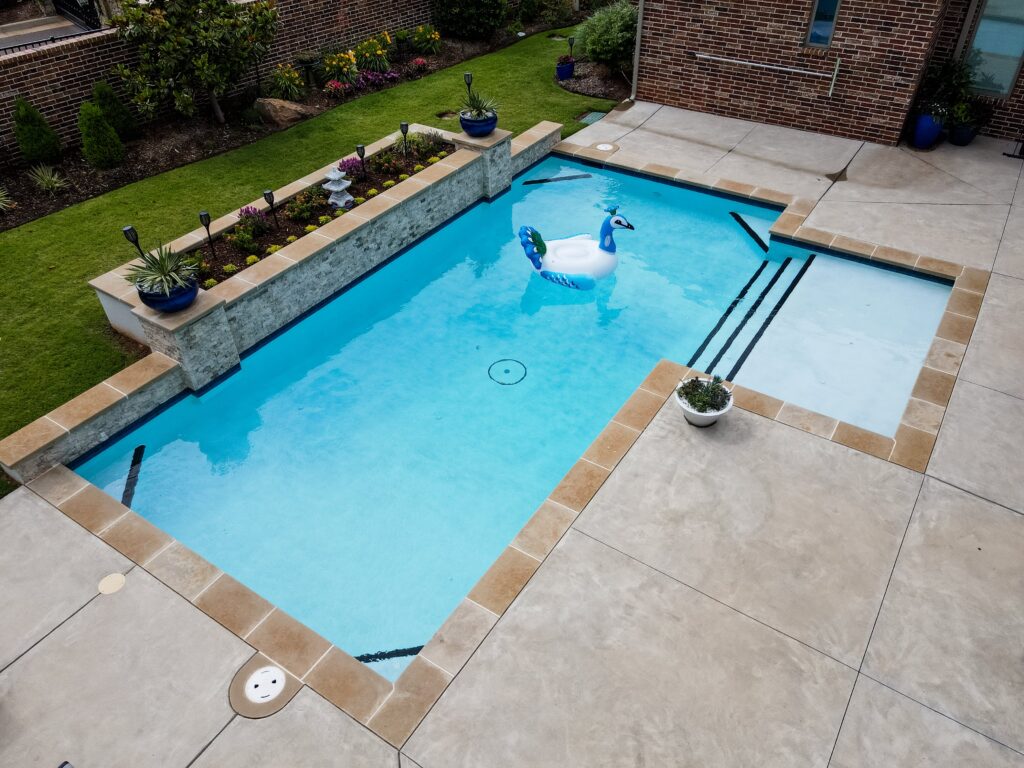Are you wondering if your pool can last 50 years? Surprisingly, with the right care, many pools can. This blog post will guide you through how different types of pools fare over time and what impacts their longevity.
Lifespan of Different Types of Pools
Different types of pools have varying lifespans. inground vinyl pools, concrete pools, and fiberglass pools each have unique durability and longevity.
Inground vinyl pools
Inground vinyl pools offer a cost-effective and versatile option for homeowners looking to install a swimming pool. The lifespan of these pools typically ranges between 10 to 20 years, but with diligent maintenance and timely replacement of the liner, which usually needs changing every 5 to 9 years, their life can be extended.
Pool longevity relies heavily on factors such as the quality of installation, regular cleaning, and maintaining balanced water chemistry.
Owners should pay attention to signs of wear in their vinyl liners like fading or cracking since these are prime indicators that maintenance or updates are needed. Upgrading pool components and ensuring the surrounding area drains properly also contribute significantly to extending an inground pool’s lifespan.
Strategies such as using a pool cover when not in use can protect the vinyl from sun damage and keep debris out, further preserving its condition over time.
Concrete pools
Concrete pools are renowned for their durability and longevity. The solid construction of concrete, reinforced with steel, ensures that these pools can withstand the test of time. Proper maintenance and occasional resurfacing can extend the lifespan even further, making concrete pools a reliable choice for homeowners seeking long-term viability in their swimming pool investment.
Concrete pools often have plaster finishes, typically composed of a mixture of cement, sand, and water, provide a smooth and water-resistant surface for the pool. While plaster may need to be replaced every 5 to 10 years, especially in regions with harsh climates or high usage, its affordability and versatility make it a popular choice among pool owners.
When considering the overall lifecycle cost of a pool, concrete’s robust nature makes it a favorable option. Its durability and ability to be easily refinished or renovated ensure that your pool remains an enjoyable feature of your home for decades.

Fiberglass pools
Fiberglass pools offer a durable and long-lasting option for homeowners. The material’s strength and flexibility help it withstand the pressure of changing soil conditions, making it less prone to cracks compared to concrete pools.
The design versatility of fiberglass pools allow for various shapes, sizes, and built-in features that can enhance the overall aesthetics and functionality of the pool.
When properly maintained, fiberglass pools can last over 50 years with minimal repairs or resurfacing needed.
Factors That Affect a Pool’s Lifespan
The longevity of a pool can be influenced by various factors. The quality of materials, regular maintenance, and the climate and location where the pool is installed all play a crucial role in determining how long a pool will last.
Coatings and Finishes
One of the key factors contributing to the longevity of pools is the ability to resurface them with various materials, depending on the homeowner’s preference and budget. Among the options for pool finishes, pebble, quartz, and ecoFINISH are popular choices known for their durability.
Pebble pool finishes, composed of small, smooth pebbles embedded in a concrete base, can last up to 15 to 20 years with proper care. Quartz pool finishes, which incorporate quartz crystals into the plaster mix, offer similar longevity, typically lasting 10 to 15 years. ecoFINISH can last over 10, making it a viable choice for homeowners looking for a smooth and long-lasting coating. Additionally, epoxy, while not as commonly used for pool finishes, can provide excellent durability, with some formulations lasting up to 7 to 10 years before needing recoating.
With occasional resurfacing, pools offer homeowners a durable and long-lasting swimming pool investment that can provide enjoyment for generations.
Maintenance and upkeep
Maintaining and keeping up with regular pool care is crucial for extending its lifespan.
Cleaning the pool’s surfaces, skimming debris, and vacuuming regularly help prevent buildup and deterioration. Checking and maintaining proper chemical levels ensures water balance and prevents damage to the pool structure or equipment.
Additionally, inspecting and servicing the pump, filter, and other mechanical components can help identify issues early on, preventing costly repairs down the road.
Climate and location
Harsh weather conditions, such as extreme heat or cold, can adversely impact the durability of pool materials. Additionally, pools located in areas prone to natural disasters like hurricanes or earthquakes may require additional reinforcement to withstand such events.
The geographical location also affects water chemistry and environmental debris that can affect the longevity of your pool. For example, pools in regions with high mineral content in their water may experience faster deterioration of materials due to increased scaling and staining.
Conclusion
Regular maintenance and using high-quality materials can help your pool last up to 50 years. Clean and maintain it regularly, repair any damages promptly, and consider upgrading to more durable materials when needed.
By taking these proactive steps, you can ensure that your pool remains an enjoyable asset for decades to come.
